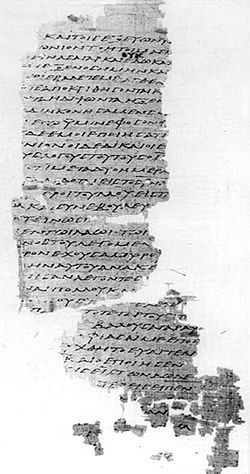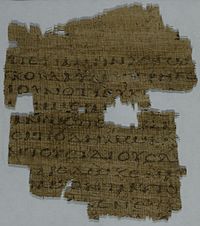Type a search term to find related articles by LIMS subject matter experts gathered from the most trusted and dynamic collaboration tools in the laboratory informatics industry.
| Matthew 25 | |
|---|---|
 Gospel of Matthew 25:41–46 on Papyrus 45, from c. AD 250 | |
| Book | Gospel of Matthew |
| Category | Gospel |
| Christian Bible part | New Testament |
| Order in the Christian part | 1 |
Matthew 25, the twenty-fifth chapter of the Gospel of Matthew, continues the Olivet Discourse or "Little Apocalypse" spoken by Jesus Christ, also described as the Eschatological Discourse,[1] which had started in chapter 24.[2]
American theologian Jason Hood, writing in the Journal of Biblical Literature, argues that chapter 23, chapter 24, and chapter 25 of the Gospel of Matthew form the fifth and final discourse in the gospel. In his reading, these three chapters together "uniquely infuse Jesus' distinctive teaching on discipleship, Christology, and judgment with the dramatic tension running throughout Matthew's plot".[3]

The original text was written in Koine Greek. Some early manuscripts containing the text of this chapter are:
It is also found in quotations from Irenaeus (AD 180) in Adversus Haereses.[4]
This chapter is divided into 46 verses. Pope Francis treats this chapter as "the 'protocol' by which we will be judged at the end of the world":
What is the protocol by which the judge will evaluate us? We find it in Chapter 25 of the Gospel of Matthew.[5]
The chapter continues a discourse commenced at Matthew 24:3 where the disciples come to Jesus to speak "privately".[6] The Parable of the Ten Virgins (verses 1-13) and the Parable of the Talents (verses 14-30) are both unique to Matthew,[7] but the Parable of the Talents has a corollary in Luke 19:11-27.
This verse begins a new parable, that of the talents or minas. There is no reference to the "kingdom of heaven" in this verse or in the parable, but the words, which mirror verse 1, are added in the King James Version and some other English translations "for the sake of grammatical completeness".[9]
The final section (verses 31-46) is sometimes referred to as The Sheep and the Goats[10] but other times referred to as "The Judgment of the Nations".[11] Although often called a "parable", it is not a story as such, but the portrayal of the Son of Man as a shepherd and the people under judgment as sheep or goats can be treated as "parabolic elements".[11]
The narrative quotes Jesus teaching that all of the people will be assembled before him and "he will separate them one from another", with some who will "inherit the kingdom" while others who will go to "the eternal fire prepared for the devil and his angels". Jesus is said to have said that the basis of this separation is whether or not someone:[11]
"Matthew 25:21" is a song title inspired by this verse on the album The Life of the World to Come that was released by the American band The Mountain Goats in 2009.[12]